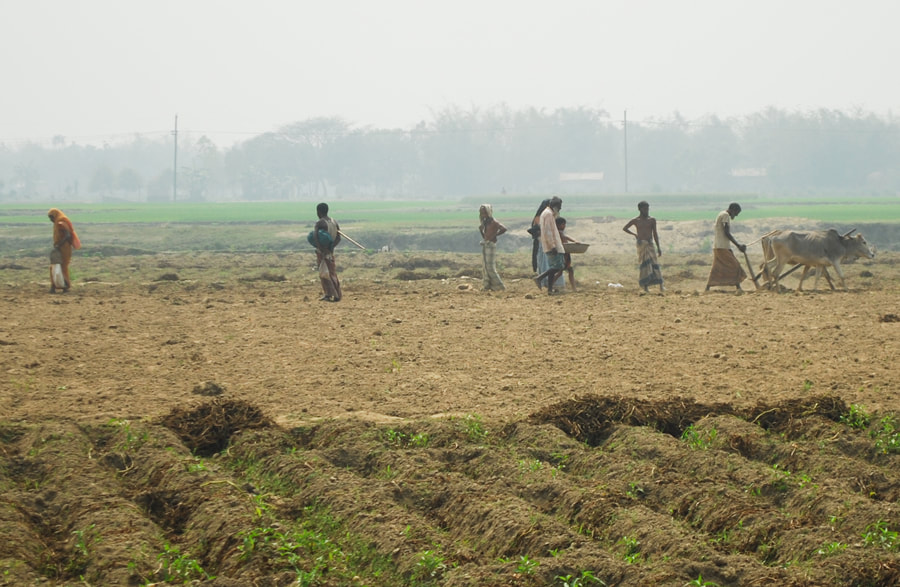|
Writer: JAKIA SULTANA Experts and scientists (including extension workers) have advised that two-fifths of the arable land of Bangladesh have become deficient in organic materials and plant essential nutrients due to the pressures required to produce multiple crops from the same quantity of lands. According to the Soil Resource Development Institute (SRDI), about 43.4 lakh hectares of the country's arable lands presently do not have a normal (optimum) percentage of organic matter level in the top soils – and that means about 42 percent of the total arable area of the country. The SRDI director, Md Delowar Hossain Molla, said in the occasion of world soil day that "around three or five percent organic matter is deemed healthy for the soil in general, but at present there is no normal amount of organic matter (or less than 1/2 percent of organic matter) in around half of the country's arable lands." The overuse of chemical fertilizer in the agricultural sector is one of the main causes of organic matter depletion. The data of Bangladesh Bureau of Statistics shows that Bangladesh has increased its use of chemical fertilizers (e.g. Urea, phosphate, potash, gypsum, etc.) by 66% from 1999 to 2008, while public subsidies in agriculture sector increased by 340% over the same period. The cropping intensity has been increased about 300% since last few decades to meet the demand for foods. In relation to the excessive use of chemical fertilizers, the growing trend of simultaneous cultivation and the lack of sustainable crop rotations ultimately lead to excessive soil nutrient extraction. It seems like soils are becoming deficient in essential plant nutrients. In past couple of decades, rice cultivation successively substituted traditional rice cultivation practices and replaced leguminous and other crops in rotations. The cultivation of leguminous plants in rice-growing intervals, however, minimizes paddy plant's nitrogen consumption and improves soil fertility. But this practice is becoming rare in Bangladesh, therefore natural recovery of nutrient pools are absent in the agricultural system. However, nitrogen remains organically and inorganically in the soil, and more than 90% of the soil nitrogen is connected with organic matter but our soils are lacking organic materials. The former Director-General, the Department of Agricultural Extension, Hamidur Rahman, said "The soil health of Bangladesh has deteriorated dramatically in the last few decades and is in reverse with the objective of producing more crops (two, three or even four crops in a year) from the similar small amounts of per capita arable land area." In one piece of land every year, farmers now produce even more hybrid and modern crop varieties with conventional agro-chemical based farming, which deliver more yield and cash, while ultimately affecting soil health and land degradation. The need to use chemicals and multiple crops to meet the growing demand for foods has not been denied, however, farmers should be encouraged to use more organic fertilizer together with recommended chemicals to recover their soil's health. Soil test based fertilizer recommendation can be very helpful in this regard, but this requires extension activity and farmer supports to test their soil samples. Unless the soil fertility condition of our arable land will deteriorate further in the years to come. Future generations food security will become vulnerable to achieve. The SRDI documents also indicate that approximately 3.7 million hectares of soil are phosphate deprived, with 2,72 million hectares deprived of potassium, 3,31 million of hectares deprived of sulfur, 275,000 of zinc and 2,49 million of boron and 300,000 of calcium and magnesium deprived. The farmers should alternately cultivate various crops in their arable lands with recommended fertilizer because various plants remove various kinds of nutrients from the soils. The use of organic manures (e.g. cowdung, compost) and addition of crop residues are essential to maintain fertility and increase organic matter of arable lands in Bangladesh. Permalink of this article: https://www.journalbinet.com/publisher-blog/world-soil-day-2017 Author name: Jakia Sultana, Bangladesh. Last update: 05 December 2017. |
Published byWe publishes articles, blog posts, news and reports on science, technology and environment. Archives
February 2021
Categories |

 RSS Feed
RSS Feed